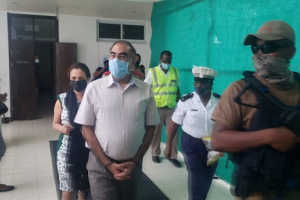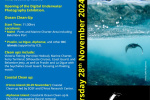Q&A: Drug trafficking remains major challenge for Seychelles, expert says

Kruger during the launch of a training session in Seychelles earlier this month. (Seychelles Nation)
(Seychelles News Agency) - Johan Kruger, UNODC's head of Transnational Organized Crime, Illicit Trafficking & Terrorism Programmes for Eastern Africa, was enlisted by the government to help strengthen the coordination between partners in the criminal justice system on matters of trafficking in persons.
SNA met with Kruger to learn more about his assistance to help Seychelles in its effort to fight such crimes.
SNA: What is your role as head of Transnational Organized Crime, Illicit Trafficking & Terrorism Programmes for Eastern Africa?
JK: My portfolio now involves the broader organised crime portfolio, including all organized crime activity, drug trafficking and arms trafficking, ammunition trafficking, cybercrime, trafficking persons and smuggling of migrants, obviously border security and a variety of activity, anti-money laundering and common denominators in the organized crime side.
I also have the counter-terrorism portfolio, which in many instances the last five to 10 years has seen very close linkages with organized crime, whether through fundraising, whether through using the same logistical outlets to get arms and ammunition and explosives and dubious technology.
SNA: When did you start working closely with Seychelles?
JK: I'm a lawyer by training. I've worked for the South African government for a long time as a prosecutor, but also in a Department of Defence. I joined journals in Southern Africa in covering SADC member States in 2007 end of 2007 and worked in the SADC region for about four years. And that's where I started working with Seychelles under the SADC umbrella. The initial discussion was very much about how to coordinate the need for strong legislation and where to start. Of course, UNODC has been working for the government of Seychelles for a long time on maritime piracy and illicit drug trafficking.
SNA: Has Seychelles progressed since then?
JK: It was remarkable for me to see the progress made that last 10 to 11 years since that very first discussion where there were a lot of uncertainties about who will lead and what legislation should look like.
To a point now where there is strong legislation in place, there is clearly a role from the government side, a willingness to engage, to request assistance from UNODC to work on these issues, both legislative but also very much practically from a criminal justice point of view. That is very much rare.
SNA: What kind of training have you been doing for Seychelles?
JK: My focus currently is to assist with assessing the legislation to determine whether there's any room for improvement. It's very good to have legislation on trafficking in persons or any crime for that matter.
So we're looking at the very practical angles of how this Act looks like from a legal perspective and whether it is practical to implement this legislation without contradicting other legislation or vice versa.
Secondly, how is this coordinated with the criminal Justice structures or the broader government to make sure that there's a common understanding as to whose responsibility it is for what and who's taking the lead on what and whether there's proper coordination in that regard.
We try to work with governments as the elements of the crime are not present for you to detect and to find the best, you have to go and look for it once. The legislation basically provides you that authority in the criminalisation of certain activities, you need to put that into practice in the national coordination.
 |
| Participants at a three-day scenario-based training exercise to strengthen coordination on the issues of trafficked persons in July. (Seychelles Nation) Photo License: CC-BY |
SNA: Do you think that Seychelles has accomplished major goals?
JK: Absolutely. Three examples would be the one that says on the trafficking of persons, adopting strong legislation back in 2014 and that showed shows commitment. It may not be perfect, the legislation may need some improvement, but making that commitment is a huge stride forward as is setting up a Secretariat that coordinates at least policy level.
So what we are looking at now for the future is how to put that into practice. Although we see successful prosecution, the test is in preventing people from being exploited in the first place, ideally, but thereafter, if there are any attempts to do so, or actual exploitation that we do see successful prosecution.
SNA: In what way has Seychelles helped in fighting the piracy scourge and other maritime related crimes?
JK: Seychelles has been a beacon of hope and a champion of justice when it came to prosecuting piracy with the assistance of UNODC. The government in that regard decided to step up and say, we will take responsibility, we will put forward resources and help rid the Horn of Africa of this scourge.
It is a great testament to the commitment of the government who is working on a very complex and very difficult matter with the United Nations to find solutions.
The Seychelles Police and Coast Guard are really working with the UN to find solutions. Those crimes don't only hurt Seychelles citizens but beyond to Southern Africa and back into Europe. It's a constantly evolving game. And it's a constantly evolving crime for which you constantly need to have these kinds of interactions.
Some questions we ask are we still using the right tools? Do we need to amend legislation to adapt to recent circumstances? How do we better detect what resources that we use? It's a constant development. The commitment from Seychelles has always been stout, it's always been right at the forefront of working with the agencies on these topics.
So regardless of the ultimate outcome of solutions we also have to be realistic about the fact that you're never going to end up with a perfect utopia environment where every potential perpetrator has been prosecuted in every flow of illicit goods and people have been stopped.
What is most important is that you have the commitment from a government politically and technically. In that regard, Seychelles has been one of our strongest partners in getting things done, and practically finding solutions. And in many cases, leading the region when it comes to putting resources forward, even in difficult circumstances, and putting people and experts into an unknown counterterrorism programme.
 |
| Kruger said that those crimes don't only hurt Seychelles citizens but beyond to Southern Africa and back into Europe. (Seychelles Nation) Photo License: CC-BY |
SNA: What would you say are still are the biggest challenges for Seychelles?
JK: Probably top of the list remains narcotics trafficking as based on location especially from countries such as Afghanistan, and that will not disappear. Essentially, it is just the geographical location and vessels such as the dhows used to transport these illicit opiates remain a concern.
Today in the digital age, the more we are connected, the more and more we see exploitation online, with digital or at least cyber enabled crime, whether it's fraud or identity theft. It is a concern not just for Seychelles, we see that across the region, that that is something that governments need to be acutely aware of that.
It's not only the good people who do trade online and we need to be able to get legislation and our criminal justice system to deal with these online threats.
Another concern is illicit financial flows, the proceeds of crime generated by the drug trade and human trafficking. Of course, that's a priority for us, at the Horn of Africa. Again it's not limited to Seychelles. But when you have these kinds of criminal activities I've just described, there are always proceeds of crime attached to it. It gets laundered and reinvested.
Human trafficking. Trafficking persons are also critical concerns especially where you have a strong fishing industry, a strong tourism industry, typically the industry is where you see exploitation take place, and where organized crime quite often find ways to exploit people one way.
SNA: What do you think needs to be done to address those challenges?
JK: There are three main areas that need to be addressed. Firstly, we need to ensure that the legal framework, compliance with international legal principles can be implemented. You might have very good legislation, but if a prosecutor cannot prove a crime has happened, because the bar is too high, when it comes to evidence as proof is important, it becomes very difficult to apply. So the legislation needs to be compliant, but it needs to be practical.
Secondly, from a national coordination point of view, you have to ensure that there is effective national coordination within government as one department cannot solve this problem. It's not a law enforcement matter only on immigration or social services or labor services, you must have an integrated, common coordinated approach.
And we are discussing with other member states to put those mechanisms in place. In the case of Seychelles, a lot of that's provided for already in legislation, it's merely a matter of putting it into practice.
The third one is to increase international cooperation through various means and mechanisms under the organised crime convention. There must be effective international cooperation in criminal matters together with Interpol through the regional Bureau.
These critical areas are the legal framework that needs to be stronger and refined when necessary and aligned with other pieces of legislation, including the penal code. We don't want to create new structures so use what you have, but coordinated. Make sure that everybody's on the same page, to a clear cut directive and standard operating procedure, and then supplement that as necessary.
SNA: Any last suggestions on the way forward for Seychelles?
JK: It is to detect something or someone out of place in Seychelles much easier as it is a smaller territory. However, people need to become more aware of the possibility of becoming a victim. They need to understand that danger, and not to believe every good story that comes along. People have been often quite willing to believe many things, obviously untrue, obviously, highly likely fraudulent, but that public component, that advocacy component is also really important to make people aware so they can avoid scams.
It's important that citizens are of how these syndicates operate. It helps the criminal justice system because if you can prevent these cases from becoming cases in the first place, you have less to deal with and more time to focus on the cases at hand. I think that brings full circle and what needs to be done.





